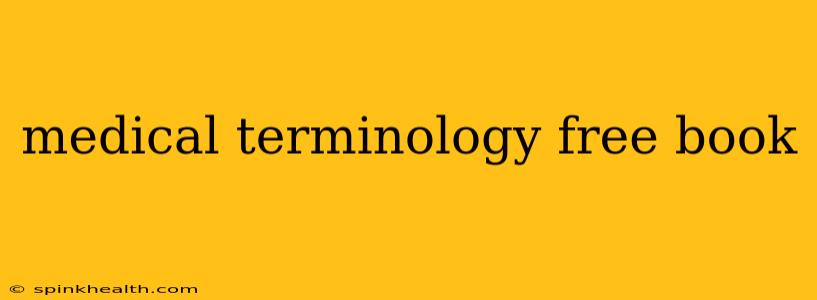Have you ever felt lost in a sea of unfamiliar words when discussing health issues with a doctor or reading medical information? The world of medicine often feels like a foreign language, filled with complex terms and acronyms. But what if I told you that unlocking the secrets of medical terminology is easier than you think? This journey into the fascinating world of medical vocabulary begins now, your free guide to understanding medical language.
This isn't just about memorizing a list; it's about understanding the building blocks of medical words. Once you grasp the fundamental components—prefixes, suffixes, and root words—you'll be amazed at how quickly you can decipher even the most challenging terms. Think of it like learning a code that unlocks the mysteries of the human body.
What are the Basic Components of Medical Terminology?
Medical terminology isn't random; it's a system built upon combining various parts. Let's break down the key elements:
1. Root Words: The Foundation of Meaning
Root words form the core meaning of a medical term. They often relate to a body part, a procedure, or a condition. For example:
- Card/o: Heart
- Hepat/o: Liver
- Gastr/o: Stomach
These root words provide the foundation upon which we build more complex terms.
2. Prefixes: Adding Specificity
Prefixes are added to the beginning of a root word to modify its meaning. They often indicate location, number, or size. Consider these examples:
- Peri-: Around (e.g., pericardium – the membrane surrounding the heart)
- Sub-: Under (e.g., sublingual – under the tongue)
- Hyper-: Excessive (e.g., hypertension – high blood pressure)
3. Suffixes: Completing the Picture
Suffixes are added to the end of a root word (or a root word combined with a prefix) to indicate a procedure, condition, or other characteristic. Here are a few key suffixes:
- -itis: Inflammation (e.g., gastritis – inflammation of the stomach)
- -ectomy: Surgical removal (e.g., appendectomy – surgical removal of the appendix)
- -oma: Tumor (e.g., carcinoma – a cancerous tumor)
How Can I Learn Medical Terminology Effectively?
Learning medical terminology effectively involves consistent practice and the right approach. Think of it as building a vocabulary, one word at a time. Here are some effective strategies:
Using Flashcards and Mnemonics:
Flashcards are a classic tool for memorization. Write the medical term on one side and its meaning on the other. Mnemonics, memory aids, can also help. Create rhymes, acronyms, or visual images to help you remember.
Practicing with Medical Texts and Resources:
Immerse yourself in the language. Read medical articles, textbooks, or even medical websites. Don't be afraid to look up unfamiliar terms. Each time you encounter a new word, add it to your flashcards.
Breaking Down Complex Medical Terms:
When encountering a complex term, break it down into its component parts (prefix, root, suffix). This helps to unlock the meaning step-by-step. For instance, "cardiomyopathy" can be broken down into:
- Cardio-: Heart
- Myo-: Muscle
- -pathy: Disease
Where Can I Find More Resources to Learn Medical Terminology?
Many online resources provide free medical terminology lessons and quizzes. While I can't link to specific websites directly, a simple search for "free medical terminology courses" or "medical terminology flashcards" will reveal many helpful tools. Remember, consistency is key!
Frequently Asked Questions (FAQ)
This section answers common questions about learning and using medical terminology.
How long does it take to learn medical terminology?
The time it takes to learn medical terminology varies depending on your learning style, prior knowledge, and dedication. Consistent effort over several weeks or months will yield significant progress.
Is there a specific order to learn medical terminology?
While there's no strict order, starting with common prefixes, suffixes, and root words is recommended. Build your knowledge gradually, focusing on terms relevant to your interests or profession.
Are there different levels of medical terminology?
Yes, medical terminology ranges in complexity. Basic terms focus on common prefixes, suffixes, and root words. Advanced terminology involves more complex combinations and specialized vocabulary.
Learning medical terminology empowers you. It allows for better communication with healthcare professionals, deeper understanding of your health, and even improved comprehension of medical research. Embrace the challenge; the rewards are worth it! Remember, this is your journey to unlock a new world of understanding. Start building your medical vocabulary today!

